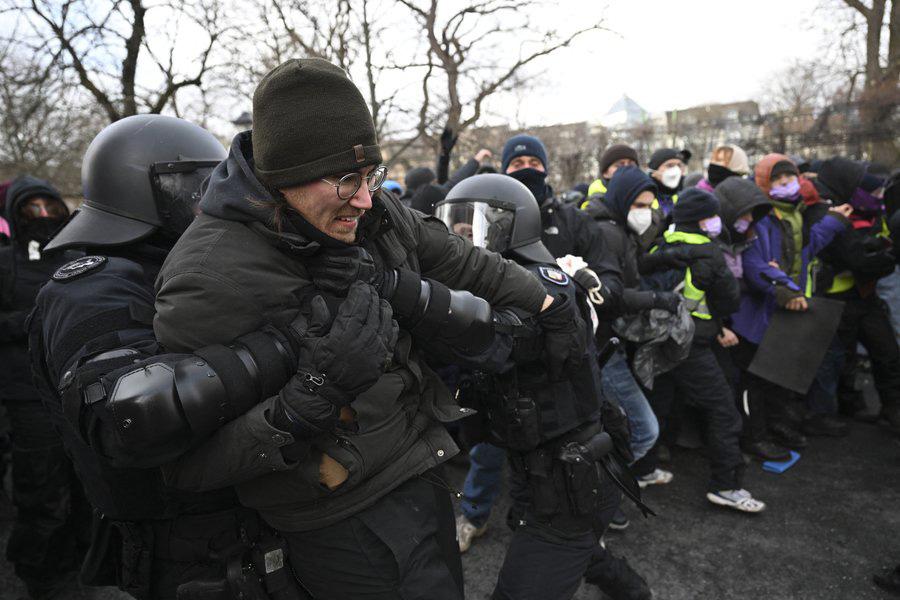Germany: Protests held against AfD congress, police reportedly beat a left-wing state lawmaker unconscious

The Alternative for Germany (AfD) elected Alice Weidel, co-chair of the party, to be its candidate for the chancellorship during its congress in Riesa, Saxony this weekend. The congress started two hours late because access roads to the venue were blocked by those opposed to the extremist party.
Police said there are about 10,000 demonstrators in the town. The Left party, which is seated in the federal legislature, announced that one of its lawmakers seated in the Saxon state legislature was beaten unconscious by police in Riesa.
Weidel, who is 45, had already been chosen in December to be their top candidate for chancellor. The congress unanimously confirmed the choice on 13 January.
The AfD was born almost 12 years ago, but this is the first time it has nominated a candidate for Chancellor. The designation is quite symbolic and does not imply any claim to forming a Government after the elections.
The move could increase the party’s visibility, however, as television stations frequently hold debates among the candidates for the Chancellor position. Weidel is an atypical member of the anti-immigration party, which is dominated by men.
Weidel is an economist with a doctorate who previously worked at the Bank of China, lives in a registered partnership with a woman originally from Sri Lanka, and is raising two children with her in Switzerland. The AfD candidate lists for the early elections in February are just 11 % female.
The Czech News Agency (ČTK) reports that opponents of the AfD, which has been labelled a populist, right-wing to ultra-right party, blocked the access roads to the congress venue and were met with tear gas from police. The congress started two hours late as a result.
Police in Saxony had previously said they were counting on 10,000 AfD opponents traveling to Riesa, which has a population of 30,000. Water cannon were ready and a helicopter surveilled the town.
At least six police officers suffered light injuries during clashes with the demonstrators. The Left said police beat Saxon MP Nam Duy Nguyen unconscious.
The entourage of the state legislator was said to have also suffered injuries during the police intervention. The Left plans to file a crime report over the incident.
Saxon Interior Minister Armin Schuster promised that the investigation of the case would be fast. The AfD is being monitored by the federal civilian counterintelligence service on suspicion of being involved in right-wing extremist activity.
In three German states – Saxony, Saxony-Anhalt and Thuringia – the local secret services say the AfD is a demonstrably ultra-right group. According to a survey published by the INSA public opinion agency, the AfD could win 22 % of the vote in the upcoming elections to become the second-strongest party in the Federal Parliament.
The favorability rating of the party has increased in recent days after spending weeks at a stable level of about 19 %. “Now we have to leave the 20 % barrier behind us and keep going,” co-chair Tino Chrupalla said at the AfD congress.
Given that other parliamentary parties refuse to cooperate with the AfD, the “hope” of its becoming a member of the next German Government is slim. The chair of the Christian Democratic Union (CDU), Friedrich Merz, who is probably going to become the next German Chancellor, reiterated today that there is no chance of that party cooperating with the AfD.
Roughly 600 congress delegates are also debating the party program today, and the contentious points of it are, among others, Germany’s relationships with Russia and the European Union, and several issues of family policy and migration policy. The congress was held almost on the exact anniversary of the publication of an article by the Correctiv investigative journalism group last year, reporting on a secret meeting of ultra-right groups in Potsdam.
That meeting was attended not just by AfD politicians, but also by members of the CDU. Those attending the meeting in November 2023, according to Correctiv, secretly discussed, among other things, what they termed “re-migration”, i.e., the idea of Germany deporting millions of people of immigrant origin.
After this information about that meeting was published, many large demonstrations against the ultra-right were held all over Germany. However, the revelations ultimately had just a short-term effect on the AfD’s favorability.